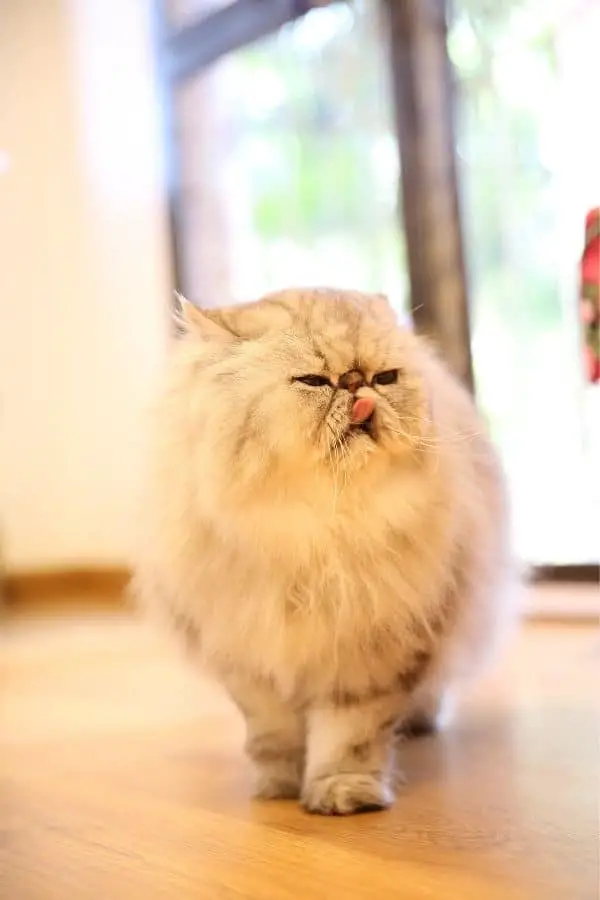More Meows is an Amazon Associate. As an Amazon Associate we earn from qualifying purchases. We may also earn commissions if you purchase products from other retailers after clicking on a link from our site.
If you have a Persian cat, you’re probably going to come across a time when you need to leave him home alone. Whether it’s for a quick work trip or a week-long vacation, it’s essential to know how long you can safely leave your Persian cat and how to make sure its needs are met when you’re away.
Adult Persian Cats can be left alone for up to 48 hours, while kittens should not be left alone longer than 6-8 hours. Depending on several factors, such as your cat’s:
- Personality
- Age
- Training
- Health
- Needs
- Safety
You may have to adjust the amount of time you can leave your cat alone.
While Persian Cats are the ideal breed for lounging and low energy, they still have several needs that must be met before you leave them for more extended amounts of time. Keep reading for tips on how long you can leave your Persian cat alone.

Persian Cat Age is the Largest Determining Factor
Age is crucial to take into consideration when trying to decide how long to leave your cat. After two years old, most adult Persians can comfortably stay home for up to 48 hours on their own. Before that two-year mark, it’ll depend on your cat’s maturity, personality, and training.
Kittens should not be left alone for long periods. The recommended amount of time is about four hours for 4-month-old kittens and eight hours for 6-month-old kittens. Going longer than these recommended times may result in your kitten feeling neglected and taking part in more destructive behavior.
To learn more about the way Persian cats age and grow, check out our article on Persian cat growth: Click Here.
Persian Cat Personality is Also Important
Personality is important to consider when trying to decide how long to leave your Persian Cat. If you have a more relaxed, unattached cat that is eager for alone time and lounging, she’ll likely be comfortable with a full 48-hour separation. She might not even notice you’re gone!
If your cat is more attached and used to more stimulation and noise throughout the day, you may need to cut your separation time down to 24 hours. If a long separation is unavoidable, one possible solution for highly anxious cats is anxiety medication. Talk to their vet to go over any medication options.
Persian Cat Health Should Be Considered
Every pet gets sick sometimes and, if your Persian cat is feeling poorly, it’s probably a good idea to stick around or have someone else care for him. You’ll need someone there to watch your cat’s behavior, keep tabs on what they are eating and drinking, and administer any medications.
You should also consider your cat’s particular food preferences. Is your cat most familiar with you feeding him directly or out of a can? If he has picky food behavior or a specific diet, it might be more difficult for you to leave him for more extended periods.
Speaking of Persian cat health, learn more about the five unique reasons Persian cats vomit: Click Here.
Persian Cat Training
Training your Persian cat is vital if you plan on leaving her for long periods. If you are gone longer than 12 hours, you need to consider training your cat to use an automatic pet feeder and/or an automated water tank. Being alone may be intimidating to a Persian cat at first, so it’s vital to get her trained to spend time alone before you leave it alone.
You’ll also need to get your cat fully familiarized with her litter box and help her to know the rules around your house. You don’t want your cat getting bored while you are gone and scratching important surfaces of your home. Start leaving her for smaller amounts of time first and build up to it so she can slowly learn what’s expected of her.
Persian Cat Needs
When deciding how long you can leave your Persian cat, you’ll need to make sure all of their needs can be met for a more extended period than usual. Their litter box will need to be fresh before you leave. After 48 hours, the litter box will be pretty dirty, so if you plan to be gone longer, you’ll need someone else to change it out or invest in a self-cleaning one.
Persian cats also need a fair amount of grooming, typically with daily brushes and teeth brushing every few days. After 48 hours, your cat will need a fair amount of care, or its coat can become matted. You also want to set out her favorite toys, pillows, and anything else that might help her feel more comfortable and safer while you are gone.

Persian Cat Environment
Persian cats can get into all sorts of mischief while their owners are away. You must create a safe environment for your cat so that you don’t need to worry about her getting hurt while you are gone. Depending on how well she is trained, you may want to keep her in a designated area of the house, such as a bedroom.
Ensure she has access to all of the things she is used to and the items that she needs to be comfortable and happy in your absence. You also might want to invest in a pet camera in her environment to drop in on her and make sure she is still safe while you are gone. You don’t want to take the risk of her suddenly getting hurt or ill without you knowing.
Leaving Cats Alone
Multiple Persian Cats or a Persian Cat with another breed can be left alone in much the same way as just one cat. Sometimes, having a friend can be excellent for Persian Cats due to their friendly and social personality. Make sure they all have sufficient water and feeding stations. You might need to get them used to separate areas for their litter boxes and feeding.
If the cats are friendly, you can allow them to stay in the same areas while you are gone, but if they tend to quarrel, likely a long absence from you will only make that behavior worse. Give them separate areas to feel comfortable and safe. Train them to get used to you being gone by leaving for longer and building up to 48-hour periods.
Keep in mind that other breeds may require more from you and need you to be home more frequently. Persian Cats are seen as a lower-maintenance breed and are more comfortable lounging without their owners for more extended periods. Other breeds might not be as pleased with the separation.
You might be wondering if your Persian cat is going to miss you. Learn more with our article on if Persian cats miss their owners: Click Here.
Summary
Persian Cats are the perfect family pet with a low-maintenance personality and gentle temperament. While they are good at being left alone for long periods, it’s essential to factor in their safety, needs, training, personality, health, and age.
Kittens younger than six months old should not be left alone for longer than 8 hours at a time. Once they reach adulthood (or two years old), Persian Cats can be left alone for up to 48 hours.
As Persian cats age into their elderly years, this time may decrease depending on health needs. Multiple cats can be left at home together as long as all of their individual needs are also met.
Every cat is different and can have different needs. Trust your instincts as their owner and only leave them when you feel confident they will be ok.
It’s better to err on the side of caution than to leave your cat alone for too long. Following these guidelines will help you determine the right amount of time your Persian cat can safely and comfortably be left alone at home.
If you enjoyed this article, check out a couple of other Persian cat articles:
- How to Clean Persian Cat Eyes (The Easy Way): Click Here.
- 9 Reasons for Persian Cat Hair Loss (Read This): Click Here.
